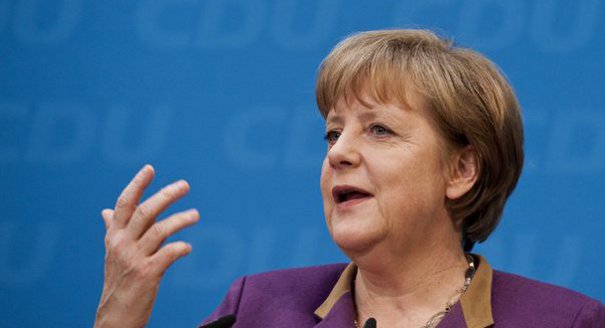Angela Merkel cannot escape the headlines.
With few exceptions, such as Gideon Rachman of the Financial Times, most are highly critical of the German Chancellor’s stance during the euro crisis.
They say that even after Sunday’s Greek elections, she is so obsessed with austerity and restructuring measures that she does not see the need for some growth stimuli. And because she does not see that, Europe will remain stuck in recession, thus weakening the credibility of the euro and indeed the whole idea of a monetary union, so her critics contend.
The second big criticism leveled against Merkel is that she does not understand that the way out of this crisis leads through much more integration that would include a fiscal union.
What is her reasoning?
Merkel does not believe that you can at the same time create a competitive economy through austerity and restructuring measures and foster growth with spending packages. It would be the same as stepping on the gas and the brake at the same time.
If the opposition Social Democrats who criticize Merkel’s policies so sharply today cared to remember their time in office, they would concede the truth of that.
When the Social Democrat Gerhard Schroder became Chancellor in 1998, he inherited a country in crisis. Throughout the 1990s the government had spent hundreds of billions of then Deutsche marks on reuniting the two Germanys while neglecting growth, competitiveness, productivity, and the miserably rigid labor market. Remember the Economist cover story? “Germany, the sick man of Europe.”
Schroder spent his first few years implementing expensive election promises which did nothing to improve the economy.
Then, in early 2003, after a series of crushing regional election defeats, Schroder bit the bullet.
With enormous courage he pushed through major labor market reforms aimed at bringing the unemployed back into the labor market by offering training schemes and job incentives. Those who turned down jobs had their welfare payments reduced.
Industry too went through a sea change, with more flexible hiring and firing arrangements. The state implemented savings measures and cut some taxes. The immediate effect was a rise in unemployment with five million Germans receiving unemployment benefits.
Schroder paid a heavy political price for pushing through these reforms. Merkel defeated him in the 2005 race to the Chancellery. History being unfair, it was only then that the economy took off and unemployment really began to drop.
There are two lessons to be learned from the Schroder reform agenda.
The first is that modernizing the economy demands immense courage, especially from a left-wing leader. And second, reforms take a long time until the turnaround happens.
So when Merkel, the beneficiary of Schroder’s efforts, speaks about austerity and restructuring, she is convinced of their success, even if it takes time.
Just look at how competitive the German economy has become, especially in terms of labor costs and productivity. According to Eurostat data, of all EU countries, Germany had the slowest increase of labor costs during the last decade.
Translating such experiences to Greece, Spain, Portugal, and Ireland is a different matter.
Merkel and especially Wolfgang Schauble, her staunchly European finance minister, are of the firm belief that these countries have to introduce deep reforms across the board.
Germany is willing to help recapitalize their banks, but only under strict supervision. Providing stimulus growth packages, at least originally, was not part of the deal. Not just because of the immense cost of such measures: Merkel and Schauble fear such packages would encourage backsliding. Reforms come first.
Under the influence of first the French and then the Greek election, both have softened their attitude somewhat. Both also are aware of the hardships created by the cuts in wages, pensions, and social benefits in the indebted eurozone countries.
But fundamentally, they still believe that the inflexibility of the labor markets, a system of far too early retirements, and the lack of vocational training for the young are root causes for the terrible state of these economies.
If these economies are to become competitive, they need a major restructuring of the public sector, banks, labor market, and education system.
There is a link between Germany’s reform policies and it’s attitude towards EU integration (and eurobonds).
Schauble has convinced Merkel that Europe must inexorably move towards more integration if the logic of monetary union is to be completed.
But Merkel, say German officials, is not prepared to go down this road, yet.
In principal, she supports further integration, even if she has never gone out of her way to explain why this would be important for Europe’s future.
But she thinks her public has to be prepared, including the euro-skeptic wing within her own Christian Democrats party. And she wants Greece and Spain, Portugal and Ireland to implement the agreed reforms before Germany signs up to more political integration. In Merkel’s view, it would be very difficult to convince German taxpayers to commit their hard-earned money to a fiscal union unless all of the eurozone economies are competitive enough to carry their own weight.
Eurozone countries like Finland and Estonia, the Benelux countries and Austria, and even Ireland agree with Merkel’s economic policies. So do several non-eurozone countries, such as Poland and Latvia. All support competitive economies. All support more economic and political integration—but only if preceded by reforms.
The only problem is that any turnaround of an economy takes time. Schroder only needed to reform his own country and still did not get to reap the benefits of his policies. Merkel, having to deal with a much more difficult situation, is unlikely to fare better, unless the critics find someone else to blame or dare give her some credit.





.jpg)
